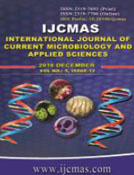


 National Academy of Agricultural Sciences (NAAS)
National Academy of Agricultural Sciences (NAAS)

|
PRINT ISSN : 2319-7692
Online ISSN : 2319-7706 Issues : 12 per year Publisher : Excellent Publishers Email : editorijcmas@gmail.com / submit@ijcmas.com Editor-in-chief: Dr.M.Prakash Index Copernicus ICV 2018: 95.39 NAAS RATING 2020: 5.38 |
Vitamin D plays a well-known important role in calcium and phosphorous homeostasis, and bone metabolism. The immune-modulator effects of vitamin D are widely investigated, and documented. Recently, there has been global interest in the association between vitamin D and allergic diseases in adults, however, pediatric studies remains not conclusive. The aim of this study was to evaluate the levels of vitamin D as well as the effect of vitamin D supplementation in children with allergic rhinitis. This study included 100 children with allergic rhinitis, aged 6-12 years, after initial assessment and comparison to control group, they were divided into 2 groups, 50 patients of them received oral vitamin D3 (cholecalciferol) 1000 IU/day supplementation for 6 months, other 50 patients received placebo for same period. Control group were composed of 50 subjects (matched age, 25 boys and 25 girls). Serum levels of vitamin D, IgE, skin prick test, beside clinical and patient reported reflective total nasal symptom score, were evaluated. Serum 25-hydroxyvitamin D levels were significantly lower (18.4± 6.1 ng/mL) in children with allergic rhinitis when compared to control group (27.58± 9.4 ng/mL), and vitamin D levels were inversely correlated with immunoglobulin-E levels(r=-0.317, P<0.001). After 6 months supplementation of oral vitamin D ,serum levels of vitamin D were significantly improved, clinical and patient reported reflective total nasal symptom score, were significantly improved compared to patients with allergic rhinitis not received vitamin D supplementation. This study demonstrates the possible relationship between vitamin D levels and allergic rhinitis in children, and its ability to improve both clinical and laboratory impairment in such patients.
 |
 |
 |
 |
 |